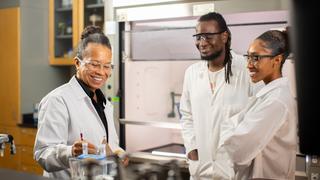Tennis was the first passion of graduating doctoral student and Nairobi, Kenya, native Joab Odera.
Embracing his love of the sport since the age of five, Odera – known to friends as J.O. – was coached by his mom, a former tennis champion, and eventually wound up at the prestigious Vandermeer Tennis Academy on Hilton Head Island. There, he met coach of Winston-Salem State University’s tennis team, who offered him a full scholarship to WSSU.
After completing his undergraduate degree, Odera chose NCCU to earn his doctoral degree in integrated biosciences.
“I chose the NCCU Ph.D. program because of its focus on research and training in health disparities, pharmaceutical science and NCCU's close partnerships with the laboratories at the University of North Carolina and Duke University,” Odera said.
He credits his mother, Elizabeth Odera, also a researcher with a Ph.D. in immunology, for much of his success.
“She got me interested in biology at a young age, and she was also my tennis coach for a long time,” Odera said. “The life skills and training she provided me were instrumental in me gaining the chance to study in the United States.”
Odera said his NCCU research advisor, Xiaoxin Luke Chen, Ph.D., was another important influence.
In Chen’s lab, Odera researched the role of Nuclear factor erythroid 2-related factor 2 (NRF2) in metabolism of alcohol and esophageal cancer.
“I really enjoyed working with Dr. Chen,” he added. “A lot of the work was translational, so we did research with the possibility of arriving at a treatment for esophageal cancer.”
Unlike esophageal cancer patients in Europe and Asia, 11% of those in western Kenya are below the age of 30, with inheritable gene mutations considered a possible source of the discrepancy.
“The NCCU Integrated Biosciences program opened my eyes to the importance of health disparities in cancer research,” he said. “There is still much that needs to be investigated. We are living at an important time in biomedical research and health care which can be seen with advances in precision medicine, increased inclusion in clinical trials, and the need to better understand how both genetic and environmental factors affect our health and our response to treatment.”
As for the future, Odera said he will be seeking new opportunities in post-doctoral positions or biopharmaceuticals in hopes of furthering his research in cancer.
And, he says, he will continue to make time to play tennis.



